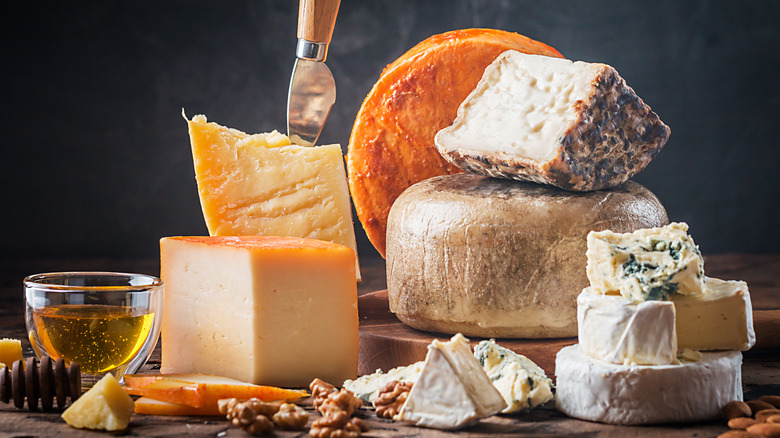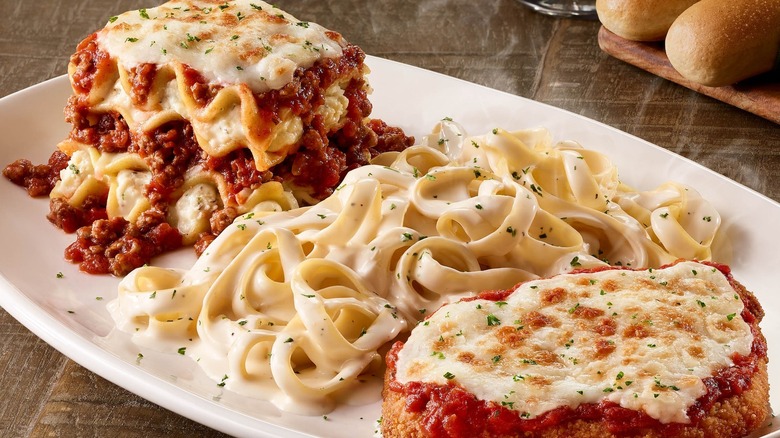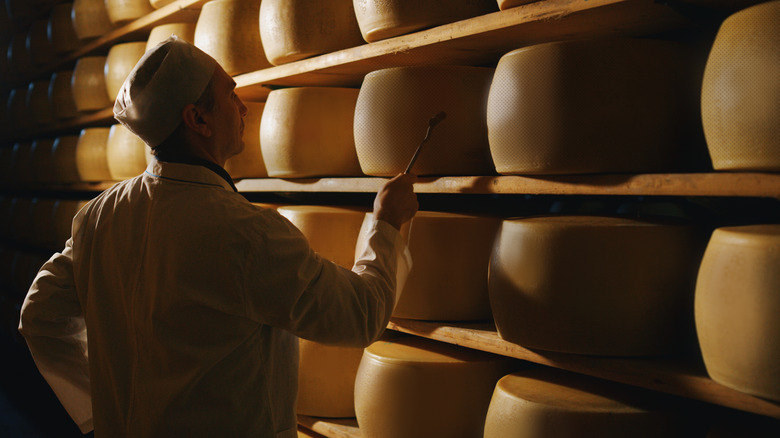Does Olive Garden Actually Get Its Cheese From Italy?
If you're craving some rich, indulgent comfort food, there's no better place to go than Olive Garden. This popular chain restaurant is known for serving up an array of flavorful dishes that never fail to satisfy, and whether you're in the mood for a steaming hot plate of Chicken Alfredo or plan to treat yourself to a tantalizing Five Cheese Ziti al Forno, Olive Garden's got plenty of cheesy choices on the menu.
But just how authentic are the fast-casual restaurant's cheesy creations? Many diners have wondered whether Olive Garden really sources its cheese from Italy or if it's just a clever marketing ploy, and luckily we have some good news for authentic cheese lovers: According to one report by ABC News, Olive Garden imports six different varieties of cheese straight from Italy.
While it's unconfirmed which of their cheeses are authentically Italian, the menu offers a range of options, from the tangy sharpness of parmesan to the creamy richness of asiago. You'll also find classic Italian cheeses like mozzarella and ricotta, plus a few more that we'll explore as we take a closer look at the types of Italian cheeses used in Olive Garden dishes and explore whether the authenticity of cheese truly matters when it comes to experiencing the flavors of Italy.
What kinds of cheeses are in Olive Garden dishes?
While we are unable to confirm which cheeses Olive Garden imports directly from Italy or the specific regions the imported cheeses are from, we are able to confirm that cheese plays a crucial role in many of the restaurant's dishes.
One such variety — and the grated goodness they'll sprinkle over your plate until you say "stop" — is parmesan cheese. While parmesan cheese is a staple in Italian cooking, these days it can be made anywhere in the world. Parmigiano Reggiano cheese, on the other hand, has to come from Italy and is strictly regulated — only cheese made in the designated provinces of Italy can obtain the coveted Protected Designation of Origin (DOP) trademark.
If Olive Garden's parmesan is real Parmigiano Reggiano, it should display the DOP mark of quality. However, because Olive Garden's menu only lists parmesan as the cheese variety and not Parmigiano Reggiano, we can assume their parmesan isn't the real deal.
Mozzarella is another Italian cheese that makes an appearance in dishes like the Lasagna Classico, along with parmesan and Pecorino Romano. In the case of the Pecorino, because the specific variety of cheese is listed, it's likely that the hard, salty cheese comes from Italy. Similarly to Parmigiano Reggiano, the cheese must be made in a certain area in order to receive its DOP. According to Cheese.com, "production of Pecorino Romano is allowed only on the islands of Sardinia, Lazio and in the Tuscan Province of Grosseto."
Does cheese authenticity matter?
When it comes to dining out, the authenticity of ingredients can be a topic of debate. This is especially true when it comes to cheese — and even more true when discussing cheese at the center of Italian cuisine.
As foodies become more invested in the sourcing of ingredients, the question arises: Does it matter where Olive Garden's cheeses come from? In general, quality is key, yes. Real cheese is usually always better than processed cheese. Authentic Italian cheeses, in particular, have a unique texture, flavor profile, and aroma that can take a dish to the next level.
However, is this really a make-it-or-break-it factor for the average consumer? Ultimately, it's up to you to decide. If you've previously enjoyed Olive Garden dishes without knowing the origin of their cheesy ingredients, it likely won't make a difference which are real and which aren't.
For those who are invested in sourcing and authenticity, it's important to note that Olive Garden does source some of its cheeses from Italy. However, the restaurant isn't too transparent about which ones those are on its menu (although thanks to our sleuthing, we could deduct a couple). At the end of the day, quality, in whatever form it takes, is the key to a satisfying dining experience. If your heart's set on enjoying a more authentic Italian experience, we can confirm that Olive Garden's house wines use grapes grown in Italy.


